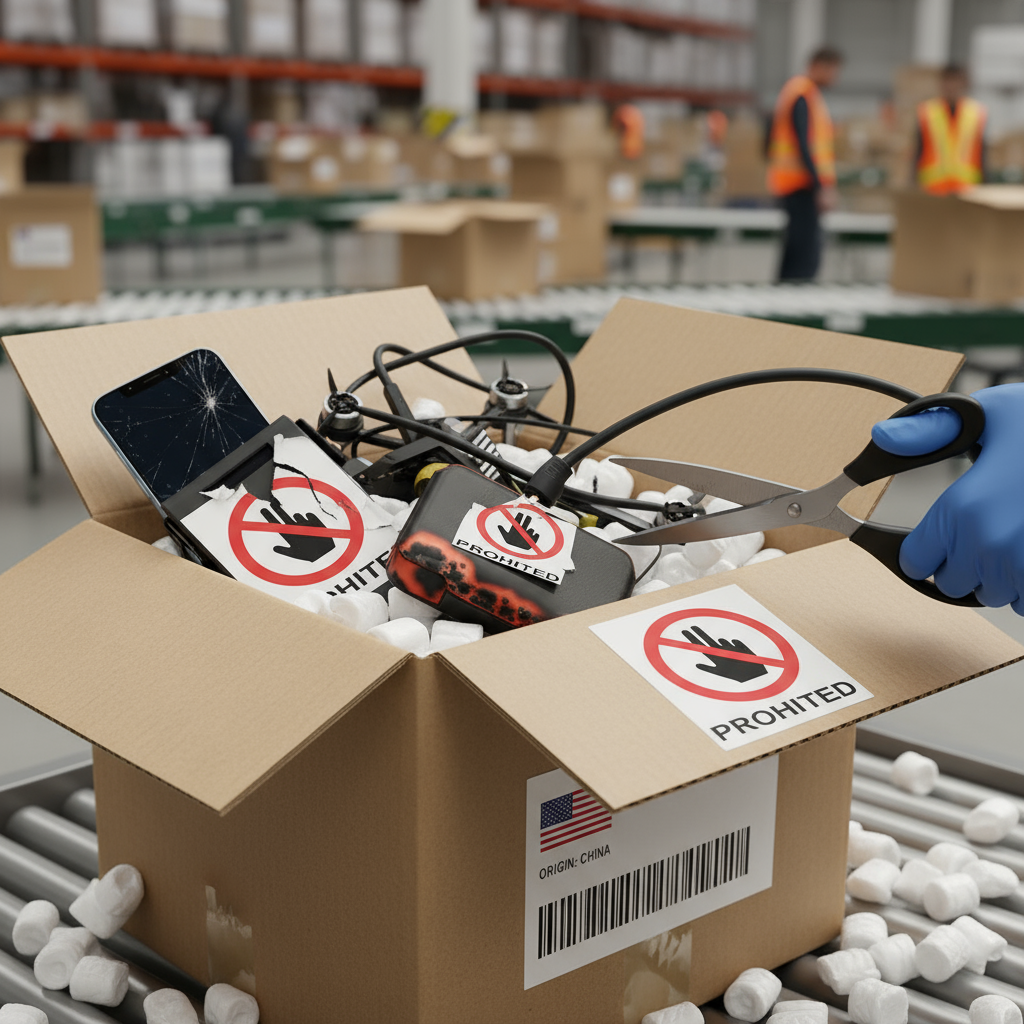The Great Digital Purge: US Retailers Yank Millions of Prohibited Chinese Electronics

Imagine this: you’re casually browsing your favorite online marketplace for that perfect new gadget, perhaps a smart home device or a sleek new drone, only to find vast swathes of listings have vanished overnight. This isn’t a dystopian fantasy; it’s the recent reality for many US consumers as major online retailers have initiated a significant purge, removing millions of listings for prohibited Chinese electronics. This isn’t just about a few faulty items; it’s a monumental shift with far-reaching implications for consumers, businesses, and the complex landscape of global commerce.
The news, initially reported by Reuters, highlights a coordinated effort by platforms like Amazon, eBay, and Walmart to delist a staggering number of products deemed non-compliant with US import regulations. The sheer scale – millions of items – underscores the gravity of the situation and raises important questions about product safety, intellectual property, and the future of cross-border trade. What exactly prompted this massive digital cleanup, and what does it mean for your next online purchase?
Unpacking the “Prohibited” Label: Safety, Standards, and Sanctions

The term “prohibited” in this context is multifaceted, encompassing a range of concerns that go beyond simple manufacturing defects. At the forefront are issues of safety and compliance with US product standards. Many electronic devices, particularly those coming from less regulated markets, may not adhere to rigorous safety testing or possess the necessary certifications. This can manifest in everything from fire hazards due to substandard wiring and batteries to electromagnetic interference with other devices.
Beyond safety, intellectual property rights play a significant role. Counterfeit electronics, which mimic legitimate brands without proper licensing, have long been a headache for both consumers and genuine manufacturers. These products often compromise on quality and offer no warranty or customer support, ultimately eroding consumer trust and harming brand reputation. The delisting efforts aim to curb the proliferation of such unauthorized goods.
Furthermore, geopolitical considerations and trade regulations are increasingly influencing what products can enter the US market. Sanctions against certain entities or regions, as well as concerns about national security, can lead to broad prohibitions on specific types of electronics or components. The digital infrastructure of many “smart” devices, for instance, raises questions about data privacy and potential vulnerabilities, making their sourcing and compliance critically important.
The Ripple Effect: What This Means for Consumers and Businesses
For eager shoppers, this digital purge will undoubtedly alter the online retail experience. You might encounter fewer options for certain product categories, particularly those known for their affordability often found from smaller, less regulated sellers. While this might feel restrictive initially, it ultimately serves to protect consumers from potentially unsafe or illegal products. The hope is that a more curated marketplace will lead to greater confidence in purchases and a reduction in product-related headaches.
However, the immediate impact could also mean higher prices for some goods as the supply shrinks and demand shifts towards compliant products. Consumers may find themselves needing to be more discerning, scrutinizing product descriptions and seller reputations more closely. This also highlights the importance of purchasing from reputable vendors and understanding the origins of the electronics you bring into your home.
For businesses, especially those smaller sellers relying on dropshipping models or importing directly from overseas, the implications are substantial. Many could see their entire inventory disappear from major platforms, leading to significant financial losses and the need to completely re-evaluate their sourcing and compliance strategies. Larger retailers, while involved in the enforcement, will also need to invest more heavily in their vetting processes and supply chain oversight to ensure they remain compliant and avoid similar incidents in the future.
A Shifting Global Landscape: Towards Greater Scrutiny and Compliance
This widespread removal of listings is not an isolated incident but rather indicative of a broader trend towards increased scrutiny of global supply chains and product compliance. Governments worldwide are intensifying their efforts to protect consumers, intellectual property, and national security in an increasingly interconnected and digitally driven marketplace. The “wild west” era of online retail, particularly for imported goods, appears to be drawing to a close.
Major online retailers, being the gatekeepers of vast consumer access, are under increasing pressure to act as responsible arbiters. This means investing in more sophisticated AI-powered detection systems, enhancing human review processes, and collaborating more closely with regulatory bodies. The long-term goal is to foster an environment where only legitimate, safe, and compliant products reach the digital shelves, thereby safeguarding both consumer welfare and fair competition.
The shift also encourages manufacturers and distributors to prioritize compliance from the outset. Rather than viewing regulations as hurdles, they must be integrated into product development and distribution strategies. This could lead to a more transparent and accountable global electronics market, where product safety features and legal standing are as important as price and innovation.
Navigating the New Normal: What Users Should Do
As consumers, adapting to this new landscape requires a degree of vigilance. Always prioritize purchasing from reputable online retailers and sellers with strong track records. Pay close attention to product certifications and safety marks, and whenever possible, opt for products from well-known brands that offer clear warranties and customer support.
If a deal seems too good to be true, it often is. Be wary of unbranded electronics with unusually low price points, especially if they lack detailed product information or safety certifications. Reporting suspicious listings to the platform can also help contribute to a safer online shopping environment for everyone. This great digital purge marks a significant step towards a more secure and trustworthy online marketplace, reflecting a commitment to putting consumer safety and legal compliance first.

